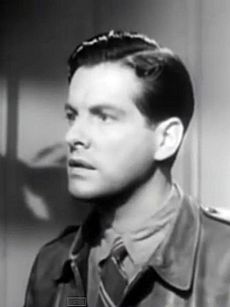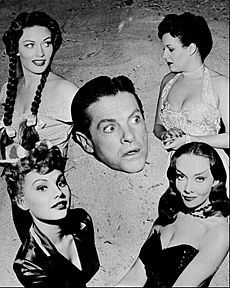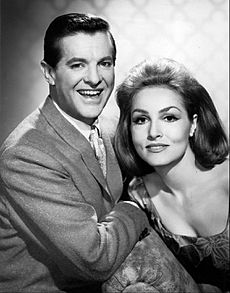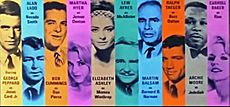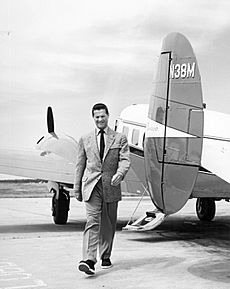Robert Cummings facts for kids
Quick facts for kids
Robert Cummings
|
|
|---|---|
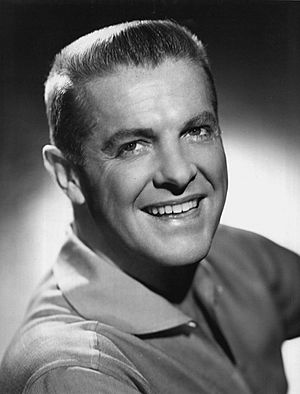
Cummings in 1956
|
|
| Born |
Charles Clarence Robert Orville Cummings
June 9, 1910 Joplin, Missouri U.S.
|
| Died | December 2, 1990 (aged 80) Los Angeles, California, U.S.
|
| Resting place | Forest Lawn Memorial Park |
| Other names | Bob Cummings Blade Stanhope Conway Bryce Hutchens |
| Alma mater | American Academy of Dramatic Arts |
| Occupation | Actor |
| Years active | 1931–1990 |
| Political party | Republican |
| Spouse(s) |
Emma Myers
(m. 1931; div. 1933)Vivi Janiss
(m. 1935; div. 1943)Mary Elliott
(m. 1945; div. 1970)Gina Fong
(m. 1971; div. 1987)Martha Burzynski
(m. 1989) |
Charles Clarence Robert Orville Cummings (June 9, 1910 – December 2, 1990) was a famous American actor. He starred in many movies and TV shows. You might know him from comedies like The Devil and Miss Jones (1941) and Princess O'Rourke (1943). He also appeared in exciting thrillers by Alfred Hitchcock, such as Saboteur (1942) and Dial M for Murder (1954). Robert Cummings was nominated for five Primetime Emmy Awards. He won an Emmy in 1955 for his amazing acting in a single performance. He has two stars on the Hollywood Walk of Fame for his work in movies and television.
Contents
Early Life and Learning to Fly
Robert Cummings was born in Joplin, Missouri. His father was a surgeon, and his mother was a minister.
When he was in Joplin High School, Robert learned to fly airplanes. His first solo flight was on March 3, 1927. Some stories say that Orville Wright, a famous aviation pioneer, taught him to fly. However, this is not true. Robert himself said he learned to fly mostly by "trial and error" from a local plumber. While in high school, he even gave rides to people in his plane for $5!
Later, when the government started giving out licenses for flight instructors, Robert Cummings received certificate No. 1. This made him the very first official flight instructor in the United States.
Education and Acting Dreams
Robert briefly studied at Drury College. But because he loved flying so much, he moved to the Carnegie Institute of Technology in Pittsburgh. There, he studied how to build airplanes.
While at Carnegie Tech, Robert started acting in plays. He enjoyed it so much that he decided to become an actor. He then studied at the American Academy of Dramatic Arts in New York City. He learned important acting rules there, like "never anticipate" and "take pride in my profession."
Starting His Acting Career
Pretending to Be British
In 1930, Robert Cummings struggled to find acting jobs. He noticed that many plays in New York were from England. English actors and accents were very popular. So, Robert came up with a clever plan.
He traveled to England and invented a new name: "Blade Stanhope Conway." He even paid someone to put his fake name on a theater sign in England. He took a picture of himself in front of the sign. Then, he sent these pictures and a letter, pretending to be "Blade" from a British theater, to many agents in New York.
When he returned to New York, his trick worked! He got several meetings. He was cast in a play called The Roof in 1931. Critics even praised his acting as "excellent." He also appeared in a Broadway show called Earl Carroll's Vanities in 1932.
Robert later encouraged a friend, Margaret Kies, to use a similar trick. She became the "British" actress Margaret Lindsay.
Changing His Name Again
In 1934, the demand for British actors changed. So, Robert changed his name again to "Bryce Hutchens." He appeared in the Ziegfeld Follies of 1934, a big show on Broadway. In this show, he sang a duet with Vivi Janiss. They later got married.
Becoming a Movie Star
Joining Paramount Pictures
After the Ziegfeld Follies tour ended in Los Angeles, Robert wanted to stay in Hollywood. He auditioned for a movie called So Red the Rose (1935). He pretended to be from Texas, using a fake accent he learned from listening to cowboy music. Even though his trick was discovered, he still got the part! Critics praised his acting and his "convincing accent."
Paramount Pictures then signed Robert Cummings to a long-term contract. He appeared in many films for them, including Desert Gold (1936) and Three Cheers for Love (1936). Most of these were smaller "B movies." He also had a small role in a bigger film, Souls at Sea (1937).
Eventually, Paramount decided not to renew his contract. Robert felt like "poison" in Hollywood.
Success at Universal Studios
In 1938, Robert got a big break. He auditioned for a romantic lead role in Three Smart Girls Grow Up (1939), starring Deanna Durbin. He told the producer he could "fake it" if he needed to sing or play music. Universal signed him to a seven-year contract.
Three Smart Girls Grow Up was a huge success! The director, Henry Koster, called Robert "brilliant, wonderful." He said Robert was the best leading man he ever worked with because he had great comedy talent and a romantic side. Critics were surprised by his "astonishing talent for light comedy."
Robert then starred in many more films for Universal and other studios. He appeared with Gloria Jean in The Under-Pup (1939) and romanced Deanna Durbin again in Spring Parade (1940). He also had a key role in Charlie McCarthy, Detective (1939).
He also became well-known for his role in the radio show Those We Love, which ran from 1938 to 1945.
Classic Films and Big Hits
Robert Cummings starred in many popular films during this time. He was in The Devil and Miss Jones (1941), which was a big success. He also appeared with Betty Grable in Moon Over Miami (1941).
He then starred in It Started with Eve (1941) with Deanna Durbin and Charles Laughton. Both It Started with Eve and Kings Row (1942) were huge hits.
One of his most famous roles was in Alfred Hitchcock's spy thriller Saboteur (1942). He played Barry Kane, an aircraft worker wrongly accused of being a spy. He tries to clear his name in an exciting adventure.
By late 1941, Robert Cummings was one of the most sought-after leading men in Hollywood.
Serving in World War II
In December 1941, Robert joined the Civil Air Patrol. This group of citizens and pilots helped the U.S. war effort. In 1942, he helped start a squadron in Glendale, California. He even helped search for a Japanese submarine that attacked an oil refinery.
During the war, Robert used his own airplanes, named "Spinach I" and "Spinach II," for search and rescue missions. He also flew courier missions and patrols. In November 1942, he joined the United States Army Air Forces and became a flight instructor. After the war, he continued to serve as a pilot in the United States Air Force Reserve, reaching the rank of captain.
Becoming a Freelance Star
After the war, Robert Cummings signed a contract with producer Hal Wallis. He starred in You Came Along (1945), where he played an Army Air Forces pilot. He also appeared in the comedy The Bride Wore Boots (1946).
Robert also started his own film production company called United California. He starred in films for his company, like the mystery The Chase (1946). He also appeared in The Lost Moment (1947) and Sleep, My Love (1948).
He continued to act in many movies for different studios. He was in The Accused (1949) and the thriller Reign of Terror (1949), set during the French Revolution. He also starred in comedies like Free for All (1949).
In 1949, he signed a deal with Columbia Pictures. He made films like Tell It to the Judge (1949) and The Petty Girl (1950). He also appeared in For Heaven's Sake (1950).
Robert also started working in television, appearing in shows like Sure as Fate and Somerset Maugham TV Theatre.
Television Star
My Hero and Dial M for Murder
In 1952, Robert Cummings got his first regular TV show, a comedy called My Hero. He played a clumsy real estate salesman. He even wrote and directed some episodes. The show ran for 33 episodes. He earned an Emmy nomination for his role.
After My Hero, Robert went to England to star in another Alfred Hitchcock film, Dial M for Murder (1954). He played the lover of Grace Kelly's character. This movie was a big hit.
Twelve Angry Men and Emmy Win
In 1954, Robert appeared in a TV play called Twelve Angry Men for Westinghouse Studio One. He played Juror Number Eight, a very important role. His performance was so good that he won the 1955 Emmy Award for Best Actor in a Single Performance.
The Bob Cummings Show
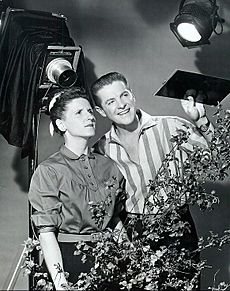
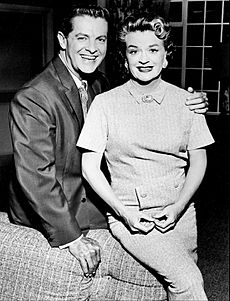
In 1954, Robert started his own film production company, Laurel Productions. In January 1955, his new TV show, The Bob Cummings Show, began airing. It was a very successful sitcom (comedy show) on NBC. In reruns, it was known as Love That Bob.
Robert played Bob Collins, a former World War II pilot who became a successful photographer. His character was a bachelor in Los Angeles who thought he was a ladies' man. A fun part of the show was when Robert played his own elderly grandfather. His co-stars included Rosemary DeCamp as his sister and Ann B. Davis as his assistant.
Robert's performance on The Bob Cummings Show earned him another Emmy nomination in 1956. He also appeared as a host for the opening day of Disneyland in 1955, alongside Ronald Reagan.
He continued to act in other TV shows, including Playhouse 90 where he starred in "Bomber's Moon" (1958).
When The Bob Cummings Show ended in 1959, Robert said it was his choice because he was tired and wanted a break.
Later TV Shows and Movies
In 1960, Robert starred in "King Nine Will Not Return", an episode of The Twilight Zone. He also appeared in other TV shows like Zane Grey Theatre.
His next TV series was The New Bob Cummings Show (1961–1962) on CBS. It was similar to his first show, with Robert playing a pilot who had many adventures.
He returned to movies with a supporting role in My Geisha (1962). He was the main star in Beach Party (1963), a popular film that first brought together Frankie Avalon and Annette Funicello. He also had supporting roles in The Carpetbaggers (1964) and What a Way to Go! (1964).
From 1964 to 1965, Robert starred in another CBS sitcom called My Living Doll. He played a scientist who lived with a robot named Rhoda, played by Julie Newmar.
Later Career and Retirement
In the late 1960s, Robert continued to act in movies like Promise Her Anything (1966) and a remake of Stagecoach (1966). He also starred in Five Golden Dragons (1967).
He made guest appearances on many popular TV shows, including The Flying Nun, Green Acres, Bewitched, and Here's Lucy.
His last main roles in films were in TV movies like The Great American Beauty Contest (1973). For over 10 years in the 1970s, Robert traveled around the U.S. performing in dinner theaters and plays. He even lived in an Airstream travel trailer during this time.
He had a small role in Three on a Date (1978) and appeared on The Love Boat in 1979. In 1986, he hosted the 15th-anniversary celebration of Walt Disney World. His very last public appearance was for the "Disneyland 35th Anniversary Special" in 1990.
Personal Life
Marriages and Family
Robert Cummings was married five times and had seven children. His first wife was Emma Myers from his hometown. His second wife was actress Vivi Janiss. His third wife, Mary Elliott, helped manage his business.
He was married to Gina Fong from 1971 to 1987, and then to Martha Burzynski in 1989. His son, Tony Cummings, also became an actor.
Hobbies and Health
Robert Cummings loved flying and owned several airplanes, all named "Spinach." He was also a strong believer in natural foods and healthy living. He even wrote a book about it called Stay Young and Vital in 1960.
He was a supporter of the Republican Party.
Death
Robert Cummings passed away on December 2, 1990, at the age of 80. He died from kidney failure and complications from pneumonia in Woodland Hills, California.
He is buried at Forest Lawn Cemetery in Glendale, California.
Filmography
| Year | Film | Role | Director | Notes |
|---|---|---|---|---|
| 1933 | Seasoned Greetings | Lita's Beau / Husband in Sunny Weather Number | Short; uncredited | |
| 1933 | Sons of the Desert | "Blade Stanhope Conway") | William A. Seiter | credited as "Blade Stanhope Conway" |
| 1935 | So Red the Rose | George Pendleton | King Vidor | |
| 1935 | The Virginia Judge | Jim Preston | Edward Sedgwick | |
| 1935 | Millions in the Air | Jimmy | Ray McCarey | |
| 1936 | Desert Gold | Fordyce 'Ford' Mortimer | James P. Hogan | |
| 1936 | Forgotten Faces | Clinton Faraday | E.A. Dupont | |
| 1936 | Border Flight | Lt. Bob Dixon | Otho Lovering | |
| 1936 | Three Cheers for Love | Jimmy Tuttle | Ray McCarey | |
| 1936 | Hollywood Boulevard | Jay Wallace | Robert Florey | |
| 1936 | The Accusing Finger | Jimmy Ellis | James P. Hogan | |
| 1936 | Hideaway Girl | Mike Winslow | George Archainbaud | |
| 1936 | Arizona Mahoney | Phillip Randall | James P. Hogan | |
| 1937 | The Last Train from Madrid | Juan Ramos | James P. Hogan | |
| 1937 | Souls at Sea | George Martin | Henry Hathaway | |
| 1937 | Sophie Lang Goes West | Curley Griffin | Charles Reisner | |
| 1937 | Wells Fargo | Prospector | Frank Lloyd | |
| 1938 | College Swing | Radio Announcer | Raoul Walsh | |
| 1938 | You and Me | Jim | Fritz Lang | |
| 1938 | The Texans | Alan Sanford | James P. Hogan | |
| 1938 | Touchdown, Army | Cadet Jimmy Howal | Kurt Neumann | |
| 1938 | I Stand Accused | Frederick A. Davis | John H. Auer | |
| 1939 | Three Smart Girls Grow Up | Harry Loren | Henry Koster | |
| 1939 | The Under-Pup | Dennis King | Richard Wallace | |
| 1939 | Rio | Bill Gregory | John Brahm | |
| 1939 | Everything Happens at Night | Ken Morgan | Irving Cummings | |
| 1939 | Charlie McCarthy, Detective | Scotty Hamilton | Frank Tuttle | |
| 1940 | And One Was Beautiful | Ridley Crane | Robert B. Sinclair | |
| 1940 | Private Affairs | Jimmy Nolan | Albert S. Rogell | |
| 1940 | Spring Parade | Corporal Harry Marten | Henry Koster | |
| 1940 | One Night in the Tropics | Steve Harper | A. Edward Sutherland | |
| 1941 | Free and Easy | Max Clemington | Edward Buzzell (uncredited) | |
| 1941 | The Devil and Miss Jones | Joe | Sam Wood | |
| 1941 | Moon Over Miami | Jeffrey Boulton | Walter Lang | |
| 1941 | It Started with Eve | Jonathan 'Johnny' Reynolds Jr. | Henry Koster | |
| 1942 | Kings Row | Parris Mitchell | Sam Wood | |
| 1942 | Saboteur | Barry Kane | Alfred Hitchcock | |
| 1942 | Between Us Girls | Jimmy Blake | Henry Koster | |
| 1943 | Forever and a Day | Ned Trimble | multiple director | |
| 1943 | Flesh and Fantasy | Michael | Julien Duvivier | Episode 1 |
| 1943 | Princess O'Rourke | Eddie O'Rourke | Norman Krasna | |
| 1945 | You Came Along | Maj. Bob Collins | John Farrow | |
| 1946 | The Bride Wore Boots | Jeff Warren | Irving Pichel | |
| 1946 | The Chase | Chuck Scott | Arthur Ripley | |
| 1947 | Heaven Only Knows | Michael, aka Mike | Albert S. Rogell | |
| 1947 | The Lost Moment | Lewis Venable | Martin Gabel | |
| 1948 | Sleep, My Love | Bruce Elcott | Douglas Sirk | |
| 1948 | Let's Live a Little | Duke Crawford | Richard Wallace | |
| 1949 | The Accused | Warren Ford | William Dieterle | |
| 1949 | Reign of Terror aka The Black Book | Charles D'Aubigny | Anthony Mann | |
| 1949 | Free for All | Christopher Parker | Charles Barton | |
| 1949 | Tell It to the Judge | Peter B. 'Pete' Webb | Norman Foster | |
| 1950 | Paid in Full | Bill Prentice | William Dieterle | |
| 1950 | The Petty Girl | George Petty aka Andrew 'Andy' Tapp | Henry Levin | |
| 1950 | For Heaven's Sake | Jeff Bolton | George Seaton | |
| 1951 | The Barefoot Mailman | Sylvanus Hurley | Earl McEvoy | |
| 1952 | The First Time | Joe Bennet | Frank Tashlin | |
| 1953 | Marry Me Again | Bill | Frank Tashlin | |
| 1954 | Lucky Me | Dick Carson | Jack Donohue | |
| 1954 | Dial M for Murder | Mark Halliday | Alfred Hitchcock | |
| 1955 | How to Be Very, Very Popular | Fillmore 'Wedge' Wedgewood | Nunnally Johnson | |
| 1962 | My Geisha | Bob Moore | Jack Cardiff | |
| 1963 | Beach Party | Professor Sutwell | William Asher | |
| 1964 | The Carpetbaggers | Dan Pierce | Edward Dmytryk | |
| 1964 | What a Way to Go! | Dr. Victor Stephanson | J. Lee Thompson | |
| 1966 | Promise Her Anything | Dr. Philip Brock | Arthur Hiller | |
| 1966 | Stagecoach | Henry Gatewood | Gordon Douglas | |
| 1967 | Five Golden Dragons | Bob Mitchell | Jeremy Summers |
Stage Work
- The Roof (1931)
- Ziegfeld Follies of 1934 (1934)
- Faithfully Yours (1951)
- The Wayward Stork (1966)
- Remember It's Never Too Late (1972)
Television Credits
- My Hero (1951–1952) as Robert S. Beanblossom
- Justice ("The Crisis") (1954)
- Disneyland (1954) as Himself
- Studio One in Hollywood (1954–1956) as George Lumley / Juror No. 8
- The George Burns and Gracie Allen Show ("A Marital Mix-Up") (1957) as Bob Collins / Bob Cummings
- General Electric Theater ("Too Good with a Gun") (1957) as Russ Baker
- The Bob Cummings Show (1955–1959) as Bob Collins / Grandpa Josh Collins / Josh Collins
- The Lucy-Desi Comedy Hour (1957–1960) ("The Ricardos Go To Japan") (1959) as Himself
- The Twilight Zone ("King Nine Will Not Return") (1960) as Capt. James Embry
- Zane Grey Theater ("The Last Bugle") (1960) as Lt. Charles Gatewood
- The New Bob Cummings Show (1961–1962) as Bob Carson
- My Living Doll (1964–1965) as Dr. Robert McDonald
- The Flying Nun ("Speak the Speech, I Pray You") (1969) as Father Walter Larson
- Gidget Grows Up (1969) as Russ Lawrence
- Love, American Style (1969–1973) as Walding (segment "Love and the Secret Spouse") / Grandpa (segment "Love and the Second Time") / Bert Palmer (segment "Love and the Pill")
- Hollywood Squares (1970) as Guest Appearance
- Green Acres ("Rest and Relaxation") (1970) as Mort Warner
- Here Come the Brides ("The She-Bear") (1970) as Jack Crosse
- Bewitched ("Samantha and the Troll") (1971) as Roland Berkley
- Here's Lucy ("Lucy's Punctured Romance") (1972) as Bob Collins
- Partners in Crime (1973) as Ralph Elsworth
- The Love Boat ("Third Wheel/Grandmother's Day/Second String Mom") (1979) as Eliott Smith
- Walt Disney's Wonderful World of Color ("Walt Disney World's 15th Anniversary Celebration") (1986) as Host / Narrator / Himself
- Disneyland's 35th Anniversary Special (1990) as Himself (final film role)
Radio Credits
- Screen Directors Playhouse ("Bachelor Mother") (1951)
- Cavalcade of America ("Going Up") (1952)
See also
 In Spanish: Robert Cummings para niños
In Spanish: Robert Cummings para niños
 | Lonnie Johnson |
 | Granville Woods |
 | Lewis Howard Latimer |
 | James West |


